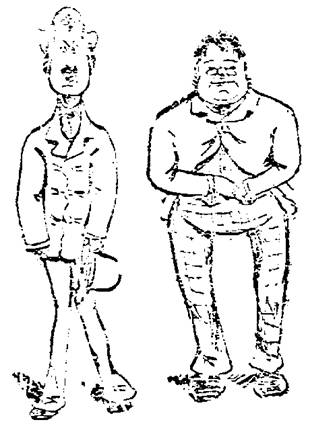This article has been transcribed from a copy of the Cardiff Times in the online collection of scanned Welsh newspapers 1804-1919 in the National Library of Wales, with grateful recognition of the free access accorded to all readers. Where necessary paragraph breaks have been introduced for easier reading.
In 1877 fear of French invasion caused the British Home Fleet to be sent to bottle up the French fleet in harbour. Samuel’s frivolous tone reflects anti-military sentiment in the Liberal party as well as opposition to the first Boer War. Light-hearted mockery of part-time soldiering dates back at least as far as George Huddesford’s poem, ‘Warley Camp’ (1778) during the American Revolutionary War. — David Skilton
Deep, sir, is the admiration of what are called the ‘irregular’ forces which I cherish, though I am indignant that they should ever be referred to as ‘irregular.’ Does this slur upon them refer, sir, to their physically irregular appearance on parade — to the fact that a little fat man is usually placed immediately beside a very long thin one, the whole line, thusly distributed, resembling a dilapidated comb — a comb which has lost the halves of a moiety of its teeth? Or can such a description as ‘irregular’ imply that our gallant amateur warriors are irregular in their conduct? Surely the latter can never be the case; surely our ‘irregulars’ are not more ‘irregular’ than the regulars — commonly known as the ‘reglars.’ We are indeed a great military nation. I always feel and recognise this fact when war breaks out, and I am the very first to rush off along with some gallant band — to see them off. Let me tell you that in this article anent our amateur soldiers I am not about to touch upon merely technical questions, such as the subject of drill. ‘Drill[‘] must naturally be a ‘bore’ to any well-regulated being — so I abstain. You may say that this is not a good and sufficient reason, and ask me why I make no reference to the technical portion of warfare. Let me give you a reason; let me whisper it in your ear — I know nothing about it. I have always had an ambition to join some kind of volunteer force, for does not an old adage say that ‘One volunteer is worth ten press men?’; therefore when I meet a volunteer, especially late on a Saturday night — when he has not had time to cast his uniform — I feel that he is better than ten like myself. When I remark that I always wanted to belong to some regiment, I ought also to candidly say that the said regiment was equally anxious that I should not. One rude fellow of a drill-sergeant once said that I ought to be accepted as a full (by the way, you have, of course, seen a ‘full’ private? I have; very full,’ indeed!) private, even if I wasn't, for I should frighten the enemy away if they even looked at me. But I had my revenge.

Chests — on the wrong side
I afterwards went and drew a picture of him, sir, with the following crushing query beneath it: ‘Who shot the dog?’ and I sent it to the Ha'penny Howler, and it duly appeared in the columns of that influential journal, and the drill-sergeant went looking for me, saying that he would run a ram-rod through me if he could but meet me alone and in a quiet spot. It was another drill-instructor who said that before I could be accepted into the corps he should have to go to a joiner to have my back planed down a bit, for that he could never hope to drill such a ‘Charley’ (I was told that the vulgar fellow meant a hump, sir) as mine down, and I felt very much humped indeed. I retorted on him; I, so to speak, as it were, up and told him that his chest was so padded that he ought to go home and get stuffed altogether. And what do you think he said to me then? Well, he began to sneer in a nasty, mean, vexatious spirit, and said that I should have a lovely chest if I could go and get my head turned round. They wouldn't even have me as a recruit, but, as you know, sir, I have often since then been round the corner recruiting myself. But all their sneers behind my back – I ought to say about my back — have not disgusted me one bit with our amateur soldier. It is true that I don't like people who go spine (dear me, ‘spying’ I mean) about a neighbour’s spine, but I will let it pass this time.

A man of military bearing
A word about Volunteer officers. It is astonishing how like the real, genuine thing they are — that is in the streets, and when their swords don't get between their legs. They stick out their chests, and straddle along with a gallant swagger, and they positively look capable of charging whole battalions — of cripples. And they love to talk on military matters — that is, if they happen to meet someone who doesn't understand anything about them. But, after all, sir, they would fight if it came to a push; I have no doubt of that. It is a wherever convenient] splendid sight to see the average full private setting forth to show the stuff he is made of on the tented field — or rather at some gala. The fact that he is, in his passage through the streets, referred to by rude and unappreciative boys in a disparaging manner unnerves him not, aye, even if they loudly and impertinently inquire whether he has been ‘Tom-Cat shootin'.’ There is one sacrifice he never seems able to make at the shrine of his military ardour, and that is, discard his ‘cutty’ pipe [clay pipe with broken stem]— except he is exceedingly young and tender, and is unable to smoke anything stronger than light shag. There is, however, sir, but one thing that a strict military critic could conscientiously complain of, and that is the fit of his clothes. His figure, as you will see by the picture, is approaching to perfection; he has a ‘front of Jove;’ (I don't quite know what a front of Jove is, unless it be a paper ‘dickey [false shirt-front];’ but the poet Spokeshave makes use of the expression, and I suppose he knew.) ‘An eye like Mars’ (or possibly Mars-in-law) ‘to threaten’ and squint, but his garments are not a success. But too many volunteer tailors seem to be endowed with a cantankerous and vengeful sort of feeling, and they give vent to it by apportioning all the big-made clothes to the little men, and vice-versa. Possibly they do it to make the amateur warriors know that they are in uniform.

A nondescript
I do not like the shabby, mean man, sir, who, in his private capacity, wears his volunteer trousers out to save his own — the man who tries to blacken the red seam in order that nobody may detect the fraud. Nor do I like the man who with his military uniform wears an ordinary check ulster. He always reminds me somehow of a man in a show waiting to do his ‘turn,’ or of a member of a town band, who has been forced into military garb against his will and pleasure. I always wonder why he doesn't, wear an ordinary top hat with his uniform, for that would be just as much in keeping as is an ulster. If ever I join any regiment, sir, that is if ever I induce one to accept my services, I shall ‘fall in’ with the yeomanry — and possibly fall off with the yeomanry, too. I am told that the members of this admirable equine corps who are unaccustomed to horse exercise, in fact, who have never been on a horse before, do enjoy themselves during a hard day's drill — l am told that they are so delighted that they actually roll off their ‘gee-gees’ sometimes. It is so nice, too — talking of this corps — for the members to have to go round borrowing their horses. If they cannot find a friend sufficiently obliging, they slip round to the nearest knacker's, or to a sausage maker’s establishment, where they can always get fitted up at a cheap rate. It is well for them to follow this latter practice, for it ensures for them a certain amount of most desirable safety, that is to say, they don't get too much mettle, too much blood, for their money; their insurance is not invalidated, and their wives and children don't get uncomfortable about them. I don't want all the corps to quarrel as to which shall have two friends of mine, who are desirous of following a military career — en amateur, of course — but I will give the portraits — most authentic and life-like ones, sir, the production of my own pencil — of both of them.

Aspiring warriors
The taller one would, I think, be best suited as a sapper – he has a sappy look about him, and a big bear-skin shako would suit him. As for the shorter, though more commanding-looking gentleman of the twain, I feel convinced that lie would excite envy in the bosoms of all his military brothers in a short undress cavalry jacket, and if he didn't, get the Victoria Cross he would get the commanding-officer as cross as you could wish.
Last modified 2 December 2021